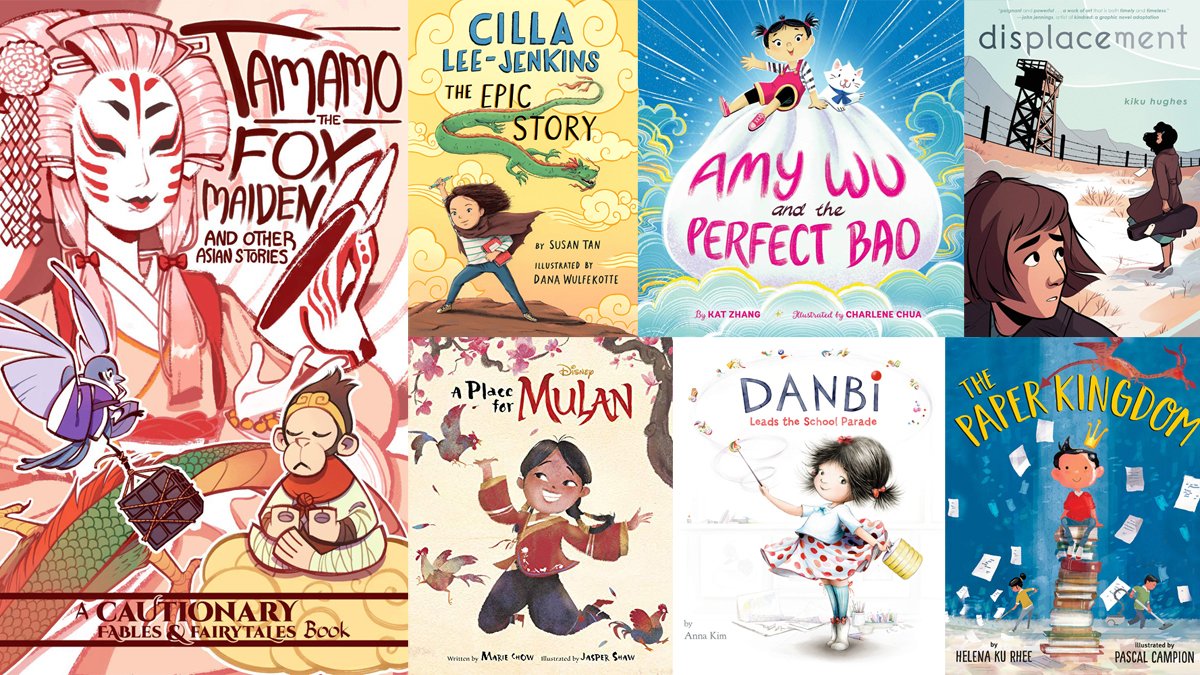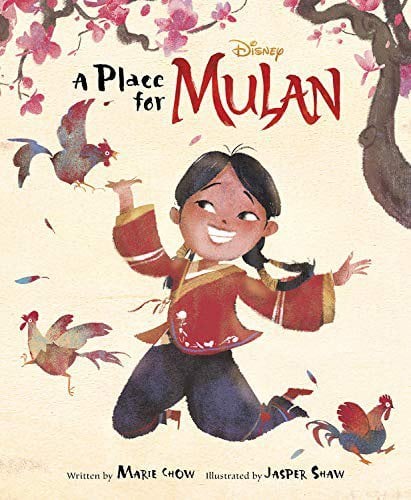May is Asian-Pacific American Heritage Month, a time to recognize the ways that Asian Americans and Pacific Islander Americans have contributed to our culture here in the United States. Here’s a stack of books to help you celebrate! It feels all the more important this year because of the way that this pandemic has allowed some to cast Asians as the “other,” reminding us that our identity as Americans has still not been fully accepted.
The books in today’s stack are primarily about East Asians, which is what I was able to find in my review stacks, but if you have some favorite books about other Asians and Pacific Islanders, please leave them in the comments!
Amy Wu and the Perfect Bao written by Kat Zhang, illustrated by Charlene Chua
Amy’s parents and grandmother are experts at making bao, the soft, fluffy, steamed buns filled with meat. But Amy just can’t quite get them right—sometimes they’re too big, sometimes they don’t close up because there’s too much filling. Today, though, she’s determined to get it right. Okay, so the conflict in this book doesn’t have super high stakes, but it’s very cute, and reading the descriptions of the bao-making process will make your mouth water. Amy’s parents and grandmother give lots of tips on how to make the bao, but of course one key to making them (that isn’t necessarily part of the story) is just lots and lots of practice! As a bonus, there’s a recipe at the back so you can try making your own perfect bao at home! (Assuming you can find flour and yeast somewhere…)
The Paper Kingdom written by Helena Ku Rhee, illustrated by Pascal Campion
Daniel’s babysitter isn’t available tonight, so his parents take him to work with them, cleaning a big office building. When he asks about the various messes that were left to clean up, his parents tell a story about a paper kingdom, friendly dragons, and a king and queen. The book shows a family that has to work hard taking care of messes that others have left while giving the next generation a dream of a better life. What’s more, Daniel isn’t just encouraged to become the next king, but to think about how to make sure his own dragons are a little more considerate to those who clean up after them. Helena Ku Rhee mentions in the author’s note that this was inspired by her own childhood: her parents were night janitors and occasionally had to take her with them, but they used stories to turn their difficult work into a magical world for her.
Danbi Leads the School Parade by Anna Kim
It’s little Danbi’s first day of school in America, and she doesn’t understand how things work: she doesn’t understand what the teacher is saying, she doesn’t know the songs the kids are singing, or the games they’re playing. But when she gets out her lunch, everyone is amazed at the delightful treats she’s brought, and that opens up a way for her to make friends. The book is inspired by Anna Kim’s own experience, immigrating to America as a young girl and feeling like an outsider when she went to school. This book is both for the outsiders—so they can see themselves as the hero of the story—and for the insiders—so they’ll want to be friends with the kids who may not fit in right away. I was particularly pleased with the way that the kids were all enchanted by Danbi’s lunch, because I was expecting them to think it was weird. I remember when I was growing up, I got made fun of for some of my lunches, but Asian foods have become more common in America now. Danbi Leads the School Parade will be released in July.
A Place for Mulan written by Marie Chow, illustrated by Jasper Shaw
Is this book from Disney press a part of their huge marketing effort for the new live-action movie? For sure. But it’s not simply a picture book adaptation of the story you already know—in fact, it actually has very little to do with her going off to war in her father’s place. It’s about Mulan as a child, not quite fitting into an expected gender role, but then figuring out who she actually is. It won’t be any surprise that the expectations placed on her are to be prim and proper, good at the loom and calligraphy, but this portrayal at least shows a family that understands Mulan and helps her find her place. The artwork is lovely and expressive, with a look that’s inspired by traditional Chinese painting by way of Disney cartoons.
Cilla Lee-Jenkins: The Epic Story written by Susan Tan, illustrated by Dana Wulfekotte
This is actually the third book in the Cilla Lee-Jenkins series, and I know I have the first two books around here somewhere, but I couldn’t quite find them. Fortunately, you do get little introductions to most of the characters and there’s not a lot of references from previous books that goes unexplained. Cilla Lee-Jenkins is a fifth grader with a Chinese dad and a white mom, and she wants nothing more than to be a great author. (The first book is called Cilla Lee-Jenkins, Future Author Extraordinaire.) The story is told from her point of view, as she thinks about her own life as an epic tale, complete with plenty of Drama, an important Quest, and various Struggles and Foes to overcome. Her fifth grade teacher is constantly talking about preparing for middle school, about being Serious and growing up, but Cilla just wants to enjoy her last year of elementary school, and wishes that it were still okay to be silly sometimes.
The book wrestles with some universal themes of growing up: Cilla’s worried about what other kids think of her, about whether she’s too old to play games about fairy houses, about whether or not she fits in. But it also has things that are particular to Cilla’s mixed-race family: her Ye Ye has a stroke and loses a lot of his ability to speak English, and Cilla worries about how her relationship with him will be affected. She also has some conversations about the expectations her Chinese grandparents had for her father when he was a kid, and the way that those have shifted for her own generation.
This series is written for middle-grade kids, and I really liked the way that Susan Tan, herself from a mixed-race family, portrayed Cilla and her family as both unique and universal. Cilla is fun character, and the book touches on a lot of important topics, but it’s also just a fun story about friendship and imagination. My own kids are like Cilla, with a Chinese dad and white mom, and it’s cool to find books that feature characters like them! I’m looking forward to catching up on the first two books … as soon as I can find them.
Tamamo the Fox Maiden and Other Asian Stories edited by Kel McDonald
This comic book is a collection of various folk tales and stories from various parts of Asia, including some that are not as often represented, like Laos, Tibet, and Myanmar. There’s a mix of stories, some silly, some serious, but all of them are some type of cautionary tale, and it’s interesting how so many of the lessons learned are similar to those we’d expect in Western stories and fables. There are some where I don’t quite understand the consequences, but the collection as a whole is a lot of fun to read. The illustration styles also vary from artist to artist, making it a diverse collection. If you enjoy fairy tales and folklore, I’d recommend this one. There are underwater kingdoms, mystical creatures who can change their forms, talking animals, greedy folks, and generous souls.
Displacement by Kiku Hughes
Displacement is both a time travel story and non-fiction of a sort: much of the story takes place in the Japanese internment camps during WWII, based on Kiku Hughes’ grandmother’s time there. But the framing of this graphic novel is that Kiku, as a teenager, is mysteriously transported into the past, where she lives through a portion of the experience herself. She doesn’t have control over her time traveling, and is instead stuck in the past in a place she doesn’t belong. As she observes, though, it’s not clear that any of the Japanese Americans belong there. Kiku gets to know some of the people in the camp, and begins to understand things about herself as well: the reasons that Japanese Americans had such a hard time talking about the camps later or didn’t teach their kids Japanese after the war, the way that they were forced to start over, the difficult position they were placed in when instructed to fill out the loyalty questionnaire. It reminds me a little of George Takei’s graphic memoir, They Called Us Enemy, which I read last fall.
In Displacement, Kiku’s “present” is in 2016 and 2017, in the time before and after the election, and Hughes makes explicit connections between the Japanese internment and some of the policies of the Trump administration, from the travel ban to the kids in detention centers. Hughes talks about the long-lasting effects that internment had on Japanese American families, even decades later, and the way that it has inspired some of them to speak up for the rights of current immigrants and refugees. It’s a thought-provoking book, one that uses time travel as a means to get to some very real, intense subject matter. Displacement will be published in August.
My Current Stack
The quarantine has slowed things down a bit in a lot of ways. One place I’ve noticed is in the book industry, which has postponed a lot of book publications and has reduced the volume of physical review copies they send out, opting for digital in many cases. That’s sort of good news for my basement, where books always pile up faster than I can get to them, though I’ve currently got enough to last me probably a couple of years before I run out, so I don’t expect to be “caught up” anytime soon.
But that also has me worried about the book industry (among others), because even though some people may have more time to read right now, a lot of the publishers are based in New York City and have been affected by the pandemic. I’ve read about layoffs at some publishers, and I’d guess that’s just the beginning. If you’re able to afford it, support a local bookstore by picking up a few books! (As I mentioned last week, Bookshop.org, where my affiliate links in this post go, lets you pick a local independent bookseller to benefit from your purchase, even if they aren’t currently taking orders themselves.)
Stay safe, and read some good books!
Disclosure: I received review copies of the books listed in this column.











